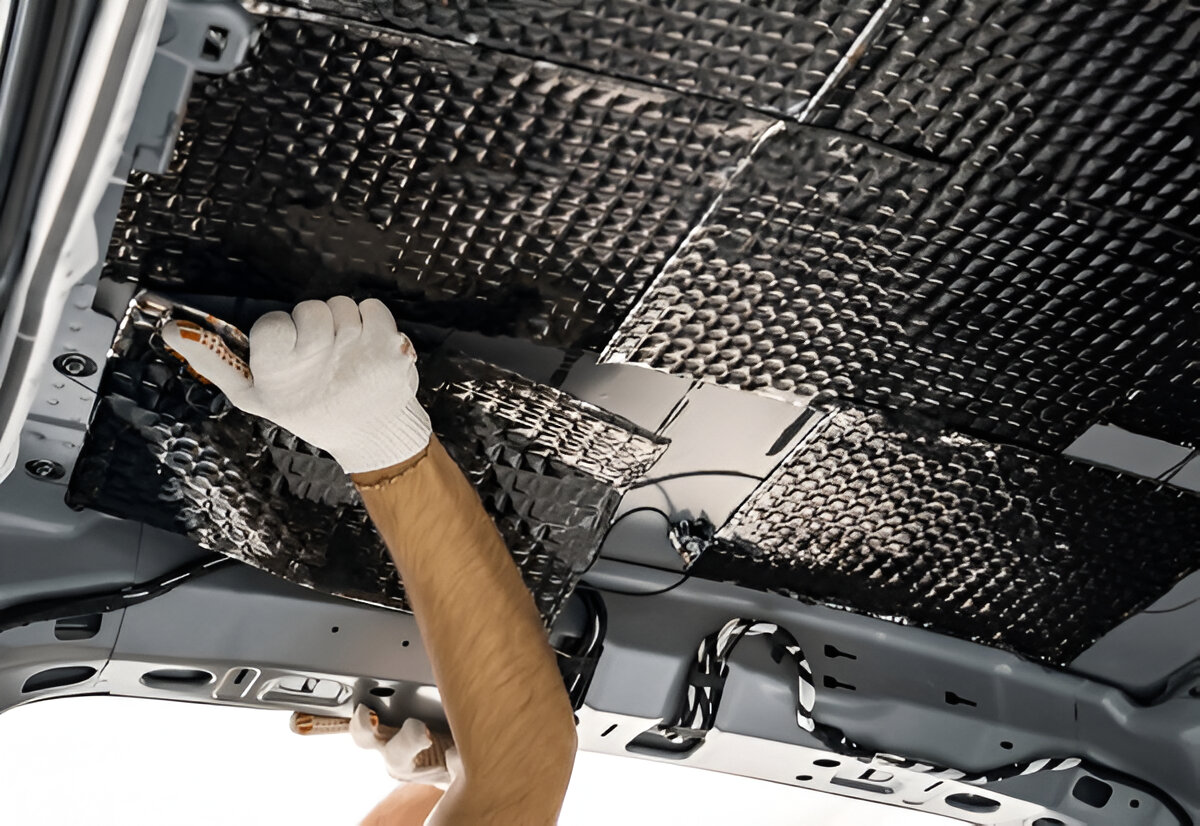It’s a sunny afternoon, and you’re driving down the highway with your coffee in hand and, music on… but all you can hear is the wind whooshing, the noise of the tyres, and that annoying sound from the back door. Suddenly, your favorite playlist sounds like background noise. Sound familiar?
You’re not alone.
Noise that you don’t want to disrupt your driving experience, whether you’re in a small car or a high-end SUV. The good news? The good news? Soundproofing your car is easier—and more effective—than most people think.
Let’s talk about what soundproofing is, which materials work best, and how you can enjoy a quieter, smoother ride starting today.
What Does It Mean to Soundproof a Car?
Soundproofing a car means reducing the amount of unwanted noise that enters or echoes within the vehicle cabin. This includes road noise, engine vibrations, wind, rattles, and even the rumble of bass-heavy music.
A well-soundproofed car feels calmer, more private, and more enjoyable.
It’s not just about comfort—it’s about focus, safety, and making your car feel like a sanctuary.
Why Do Cars Need Soundproofing?
Here’s why people choose to soundproof their cars:
- Reduce road noise on highways and rough terrain
- Eliminate vibration or rattling from loose parts with sound damping sheets for cars
- Improve speaker and sound system clarity
- Minimize outside distractions for a focused drive
- Boost privacy for phone calls and conversations
- Feel less fatigued after long-distance drives
Did You Know?
According to the National Centre for Biotechnology Information (NCBI) study that found that being surrounded around loud cars for a long time can make you more stressed and less focused, especially if you have to drive for more than 30 minutes.
What Are the Main Noise Sources in a Vehicle?
Noise can sneak into your car from multiple angles. Here’s where to look:
- Doors and Panels: Thin metal doors can let in traffic, wind, and vibration. Installing sound damping sheets for cars inside the door panels helps a lot.
- Floorboards: Tire and road noise enters through the undercarriage and floor pan—especially in older or economy vehicles.
- Wheel Wells: Excessive noise from tires and gravel hits the wheel wells. Without insulation, that sound echoes into the cabin.
- Trunk and Boot Area: This is often overlooked, but a large source of echo and low-frequency rumble comes from the trunk—especially in hatchbacks.
- Roof and Ceiling: Rain and wind noise amplify on the roof. Adding insulation helps tone down those harsh frequencies.
- Engine Compartment: Especially in diesel or older vehicles, engine noise seeps through the firewall—between the engine bay and cabin.
What Is a Sound Deadening Sheet?
A sound deadening sheet (or sound damping sheet) is a specially engineered material that absorbs and dissipates sound waves and vibrations. These are applied inside doors, floors, trunks, and more to reduce noise.
There are multiple types of soundproofing materials, but damping sheets are the most common and effective.
They’re lightweight, flexible, adhesive-backed, and can be trimmed to size.
What’s the Difference Between Soundproofing and Sound Deadening?
People often confuse the terms. Here’s a quick table to break it down:
| Term | Meaning | Where It’s Used |
| Soundproofing | Prevents external sound from entering or escaping a space | Recording studios, theaters, some car parts |
| Sound Deadening | Reduces internal vibration and resonance inside materials | Car floors, doors, panels |
| Sound Damping Sheet | A specific product that controls sound energy and stops metal rattles | Applied inside car parts for smoother cabin sound |
| Sound Insulation | Adds bulk to block noise completely | Roof, walls, engine compartment |
In short: if you’re trying to stop vibration and road noise—use sound damping sheets for cars. If you’re trying to block all outside noise completely—that’s a more complex job.
How Can I Soundproof My Car in 5 Steps?
Soundproofing your car doesn’t need a mechanic. Here’s how it works:
- Plan Your Zones: Decide where to install: Doors, floors, trunk, and roof offer the biggest improvements.
- Clean the Surface: Remove dirt, oil, or rust. Sheets stick best to clean metal.
- Cut the Damping Sheet: Trim your sound damping sheet to fit the door or panel you’re treating.
- Peel and Stick: Most sheets come with peel-and-stick backing. Apply them firmly using a roller.
- Add Layers if Needed: Want maximum quiet? Add foam or insulation over the sheets for even better results.
“Quality is never an accident. It is always the result of intelligent effort.” – John Ruskin
Where Should I Install Sound Damping Sheets for the Best Results?
Start with these high-impact areas:
- Doors – Improves stereo quality and blocks traffic noise
- Floor pan – Reduces tire hum and vibration
- Trunk – Prevents echo, especially for bass-heavy speakers
- Roof – Softens rain, wind, and exterior sound
What Is the Best Sound Deadening Material for Cars?
There are multiple options depending on your needs:
| Material Type | Best For | Key Benefit |
| Butyl Rubber Sheets | Doors, floors, trunks | Easy to apply, high vibration absorption |
| Closed-cell Foam | Roof, panels, and under carpets | Adds mass and insulation |
| Aluminum-faced Sheets | Hot areas like the engine bay | Heat resistant, ideal for firewalls |
| Spray-on Sound Deadener | Hard-to-reach spaces | Flexible application, works on textured surfaces |
Combination Tip:
Use butyl sheets + foam layer for the quietest results.
Is Soundproofing Worth It in Older Cars?
Absolutely. Older cars lack modern insulation, so they often feel loud or hollow. Even applying sound damping sheets for cars to just the doors or trunk can transform the driving experience.
What Makes FlexoGuard Sound Damping Sheets Stand Out?
FlexoGuard sound damping sheets are designed with flexibility, durability, and performance in mind. Here’s why they work:
- High-quality adhesive for lasting grip
- Easy to trim and install
- Designed for a broad frequency range
- Doesn’t emit odor or degrade over time
- Resistant to heat, moisture, and vibration
Want a better ride without replacing your car? Just upgrade what’s under the panels.
Why It’s Not Just About Music—Soundproofing Affects Your Safety Too
How Does Car Soundproofing Help with Driver Focus?
Studies show that excessive cabin noise leads to:
- Delayed reaction time
- Reduced concentration
- Increased fatigue
A quieter car isn’t just more comfortable—it’s a safer place to drive.
What About Professional vs. DIY Installation?
For most car owners, DIY installation works perfectly. Damping sheets are designed for ease. However, if you’re soundproofing the entire vehicle or working with electrical components, a professional installer can help.
Where Can I Get Quality Sound Damping Sheets in Pakistan?
If you’re ready to quiet your cabin, you might wonder, “Where do I find reliable materials?”
Polycrafts Pvt. Ltd. can help with that. Being a trusted manufacturer of automotive parts and accessories in Pakistan, we provide high-performance soundproofing solutions that install easily. Our sound damping sheets are crafted for real-world driving conditions and tested to reduce noise, vibration, and cabin fatigue.
Whether you need a full solution or a small upgrade, Polycrafts helps your vehicle sound as good as it looks. And the best part? It’s all locally available—made in Pakistan, for Pakistani roads.
Final Verdict—Is Soundproofing Worth It?
Here’s the takeaway:
- Sound damping sheets are the easiest and most effective way to reduce noise
- Start with the doors and floors for the biggest impact
- Don’t overlook trunk and roof areas for full comfort
- Choose durable, heat-resistant sheets like FlexoGuard
- always clean surfaces before installation for best results
“Music is the silence between the notes.” – Claude Debussy
In a soundproofed car, every note matters. Every ride becomes smoother. Every conversation feels closer.
And it all starts with a few quiet upgrades.
FAQs About Soundproofing Your Car
How long do sound damping sheets last?
Most high-quality sheets last 8–10 years, depending on exposure to heat and moisture.
Can I remove the sheets later?
Yes, but they can leave residue. Use adhesive remover if needed.
Are damping sheets heat resistant?
Yes—especially butyl-based products with aluminum backing like FlexoGuard.
Will soundproofing improve my music quality?
Absolutely. Reduced background noise means clearer audio, especially bass and vocals.
Is it safe to use these sheets near electronics?
Yes, they’re designed to be non-conductive and safe for vehicle wiring zones.
Visit here for more informative blogs


